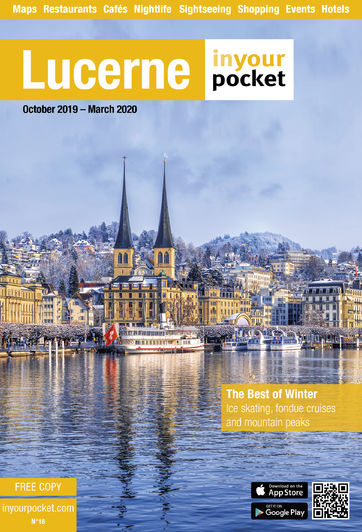The 'city of light' emerges
Stone age – IX Century
Although stone-age settlements and the Romans left a few traces, Lucerne doesn't emerge out of the darkness of history until around 840. The name Luciaria is mentioned in documents, which may mean 'place of light' – it is a popular sobriquet for Lucerne today. This early mediaeval town consisted mainly of the Benedictine abbey of Saint Leodegar, who is the town's patron saint, and the houses at either end of the bridge across the River Reuss.
A trans-Alpine trade boom
XII – XVII Century
Lucerne was long a regional market town, and the weekly market on Tuesdays (still held today!) supplied the town's hinterland for centuries. In the 13th century north-south trade across the Gotthard turned Lucerne into a major commercial centre. The trade across this Alpine pass mainly connected the Upper Rhine Plain and Milano, and boomed right up until the 17th century.
Alliances with the 'forest counties'
XIII – XIV Century
Preceding the 15th century, Lucerne was unproblematically under Habsburg rule. In 1332, due to a power struggle between the German kings Ludwig and Friedrich, Lucerne entered a pact with the three waldstätten or 'forest counties', Uri, Schwyz and Unterwalden which encircle Lake Lucerne (or the Vierwaldstättersee, the 'lake of the four forest counties', as it is known locally). This military alliance was slowly to expand until it became the Swiss confederacy, the precursor of the modern Swiss state.
Lucerne is big in Rome
XVI – XVII Century
Religion became a big issue in the 1500s as the Reformation swept across Europe. Neighbouring confederates Zurich and Bern both grasped the new confession. Lucerne, however, remained with the old faith and became a centre of Catholicism, with new monasteries of the Capuchins, Jesuits and Ursulines being built in the 16th and 17th centuries. Faith also caused tensions (and wars!) within the Swiss confederacy, and Lucerne became the leader of the Catholic camp. In this role, Lucerne became the seat of the nuncio, the papal envoy, in 1586 and the seat of the Spanish ambassador in 1595.
Profits from the war business
XV – XIX Century
Apart from trans-Alpine trade, a major source of income in Lucerne and its backcountry were mercenaries, young Swiss men who were sent to fight for France, Spain, the Duchy of Savoy or other powers of the day. Between ca. 1400 and 1800 around 50,000 men had left the Lucerne area to serve abroad – and the city of Lucerne only had a population of around 4000 for most of that period! While a few of the mercenaries came back rich, many did not come back at all and the well connected families who brokered the deals were the ones who benefited most.
Napoleon and the beginning of tourism
XVIII – XIX Century
In 1798 Lucerne lost its independence as Napoleon occupied the Swiss Confederacy and transformed it into the Helvetic Republic for a brief five years. After a return of the old powers, Switzerland was born in 1848, when the modern nation state was founded. In 1859 modernity reached Lucerne in the shape of the railway, and the town started expanding in earnest on the southern shore of the river. From 1830 onwards Lucerne had a new industry – tourism. The lake, the easily accessible mountains and some of the earliest mountain railways made it a favourite destination for the still very exclusive group of people who could afford to travel for pleasure. Many of the grand hotels and attractions like the Gletschergarten were built towards the end of the 19th century.
Modern-day Lucerne
XX - XI Century
In the 20th century, Lucerne developed into a vibrant centre for the region of Central Switzerland, becoming a university city in 2000. The concert hall KKL by architect Jean Nouvel was also opened in 2000, giving the town a new face. In the realm of culture Lucerne is famous for hosting the second largest (after Basel) and loudest Swiss carnival and the Lucerne Festival for classical music. The festival enjoys huge international renown, particularly due to Claudio Abbado who was head conductor from 2003 until his sudden death in 2014.




